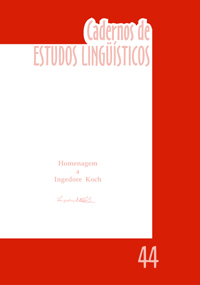Resumo
This article analyses some processes of reference in the representation of women in politics in the media. The results point to a close relationship between discourse and social identity as well as that reference is a contextualized activity related to socially constructed ideologies.Referências
DÓRIA, P.A. (2002). A candidata que virou picolé. Caros Amigos – série Histórias Inéditas. Casa Amarela.
GIDDENS, A. (1991). Modernity and Self Identity: Self and Society in the Late Modern Age. Cambridge. Polity Press.
KOCH, I.V. (2002). Desvendando os segredos do Texto. Cortez Editora. São Paulo.
MARCUSCHI, L.A. (2000a). A articulação de orações no contexto da produção discursiva: uma tomada de posição. (mimeo)
MARCUSCHI, L.A. (2000b). Quando a referenciação é uma inferência. (mimeo).
MARX, K. & ENGELS, F. (1973). The communist Manifesto. In Revolutions of 1848. Harmondsworth: Penguin Books.
TAJFEL, H. (1978). (ed.) Differentiation between Social Groups:Studies in the Social Psychology of Intergroup Relations. London: Academic Press.
TAJFEL, H. e Turner, J. (1979). An Integrative Theory of Intergroup Conflict. In W.H. Austin and S. Worchel (eds), The Social Psychology of Intergroup Relations. Montery, CA.: Brooks-Cole.
VAN DIJK, T.A. (1998). Ideology. A multidisciplinary Approach. London Sage.
VAN DIJK, T.A. (2001). Knowledge and News (mimeo).
O periódico Cadernos de Estudos Linguísticos utiliza a licença do Creative Commons (CC), preservando assim, a integridade dos artigos em ambiente de acesso aberto.

